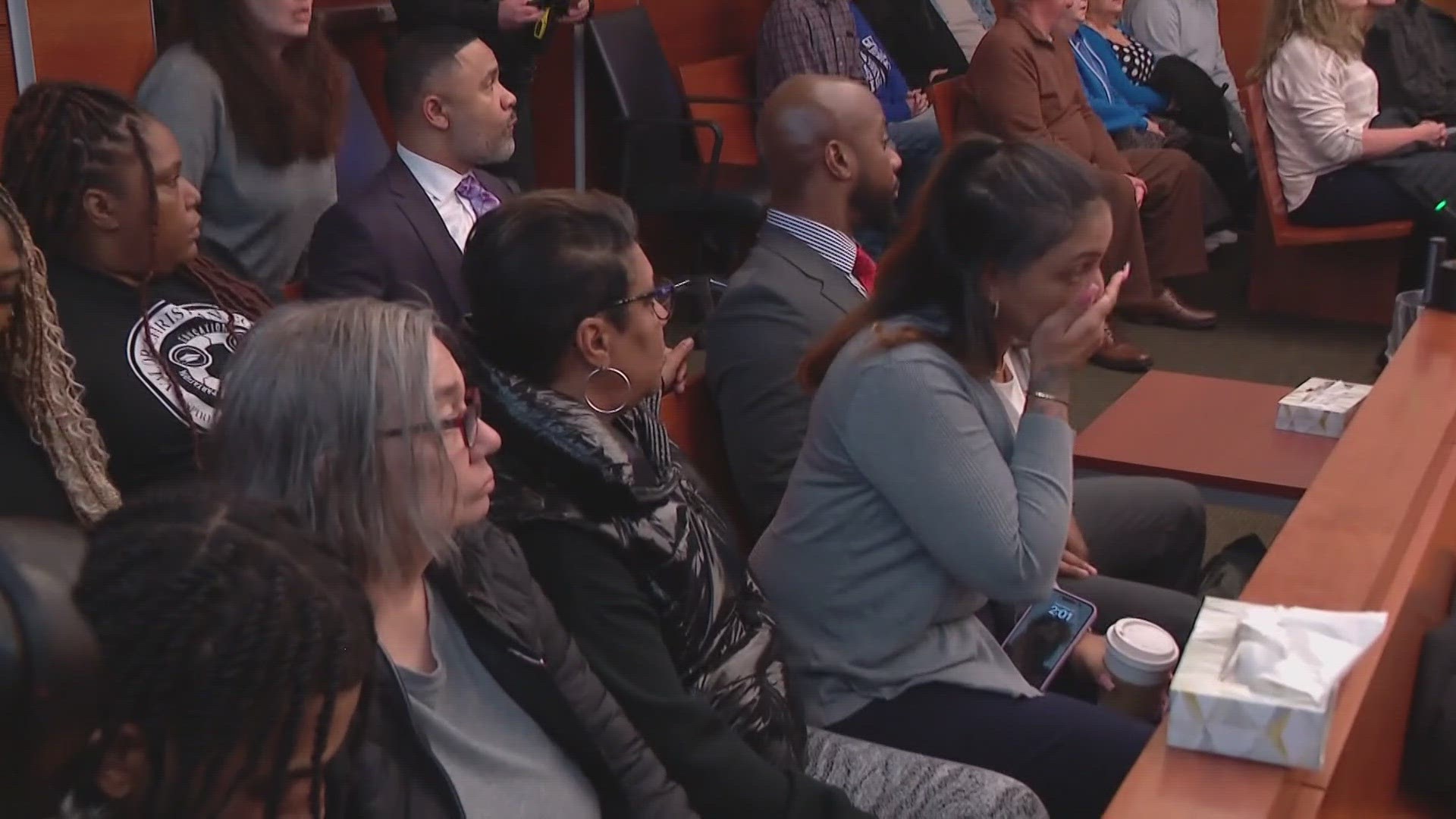COLUMBUS, Ohio — A Franklin County Common Pleas Court judge ended the murder trial of former Franklin County sheriff's deputy Jason Meade by declaring a mistrial Friday. The jury came forward and told the judge that they were unable to make a unanimous decision after two weeks of hearing statements and testimony.
Meade is charged with two counts of murder and reckless homicide in the December 2020 killing of 23-year-old Casey Goodson Jr. in Columbus.
Judge David Young declared "mistrial" twice on Friday — the first time resulted in him backpedaling and reading a question from jurors before telling them to resume deliberating.
Jurors came to Young again to say they couldn't agree and he instructed them to keep trying. He declared a final mistrial about two hours after that when jurors — some of whom were crying — said they were deadlocked.
Four jurors were dismissed during the trial.
Court officials did not say why the jurors were removed, but they can be dismissed for a number of reasons, including if they fall sick, research the case outside the deliberation room, or talk about it to someone outside the court.
What could come next in Jason Meade's trial?
Young will meet with prosecutors and defense lawyers to decide how to proceed with the case, but it wasn't clear Friday when that would happen.
After a mistrial is declared, the jury is dismissed and the case will have to be retried unless there's a plea in the case, Ric Simmons, a professor at The Ohio State University Moritz College of Law, told 10TV's Carly D'Eon.
A retrial would mean a whole new set of jurors hearing from the same witnesses.
Simmons explained that this is a case where a jury is necessary because it comes down to a question of fact.
"Juries have to decide whether or not this victim had a gun in his hand, whether or not he was pointing at the police officer, questions of credibility of all the witnesses who testified," Simmons said.
Simmons said oftentimes attorneys for the state and defense will try to contact the jurors after a mistrial to help in figuring out what to do differently to prevent another mistrial from occurring and to determine what the split was.
"Multiple mistrials are rare," Simmons said. "After two or three mistrials, you will almost always see some kind of plea bargain happening and now this case might be different... I would expect another trial in this case, at least one more, to come to verdict."
Simmons said, generally in retrials, the judge stays the same and the attorneys on both sides remain the same. The only thing that would change would be the jury.
Sean Walton, an attorney for the Goodson family, told reporters that while there was indeed a mistrial, there were still jurors who clearly considered all the evidence and thought Meade was guilty.
“There were jurors back there that obviously felt that Jason Meade was responsible for the unjustifiable killing of Casey Goodson. And that should make a statement,” Walton said.
The nearly four years since Goodson was killed have been a “rollercoaster of extremes” for his family, Walton said.
Meade’s attorney, Mark Collins, expressed gratitude for how hard the jurors worked to be “as fair and impartial as possible,” and said he and Meade are “ready to go,” if a second trial is set.
“This is just the first step in the process,” Collins said.
The special prosecutors who handled the case did not comment before leaving the courthouse. Franklin County Prosecuting Attorney G. Gary Tyack’s office issued a news release saying their thoughts are with the Goodson family, and that they will decide whether to retry the case after a review.
What happened in the first trial?
Meade testified that Goodson waved a gun at him as the two drove past each other so he pursued Goodson because he feared for his life and the lives of others. He said he eventually shot Goodson in the doorway of his grandmother’s home because the young man turned toward him with a gun.
Goodson’s family and prosecutors have said he was holding a sandwich bag in one hand and his keys in the other when he was fatally shot. They do not dispute that Goodson may have been carrying a gun and note he had a license to carry a firearm.
Goodson’s weapon was found on his grandmother’s kitchen floor with the safety mechanism engaged.
There is no body camera video of the shooting, and prosecutors repeatedly asserted that Meade is the only person who testified Goodson was holding a gun. Meade was not wearing a body camera.
During closing arguments on Wednesday, prosecutors said Meade's claims about Goodson posing a threat were simply not credible. Defense lawyers insisted that the evidence in the case was consistent with Meade's testimony.

